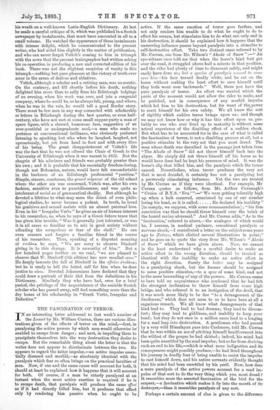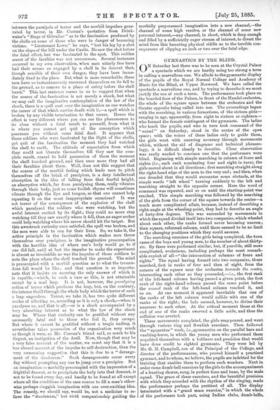THE FASCINATION OF TERROR.
IN an interesting letter addressed to last week's number of the Lancet by Mr. William Curran, there are various illus- trations given of the effects of terror on the mind,—first, in paralysing the active powers by which men would otherwise be enabled to escape from danger; and next, in impelling them to precipitate themselves into the very destruction they desire to escape. But the remarkable thing about the letter is that the writer does not appear to discriminate between the two. He appears to regard the latter impulse,—an active impulse essen- tially diseased and morbid,—as absolutely identical with the paralysis which fear so often brings on the practical faculties of men. Now if one and the same cause will account for both, it should at least be explained how it happens that it will account for both. Of course, if a man be utterly paralysed at an instant when the most active exertion is required if he is to escape death, that paralysis will produce the same effect as if it had directly killed him, but it produces that effect only by rendering him passive when he ought to be active. If the same emotion of terror goes farther, and not only renders him unable to do what he ought to do to effect his escape, but stimulates him to do what can only end in his destruction, it should be explained how it happens that the unnerving influence passes beyond paralysis into a stimulus to self-destructive effort. Take two distinct cases referred to by Mr. Curran, one from Mr. Wilson's "Abode of Snow " :—" An eye-witness once told, me that when the horse's hind foot got over the road, it struggled above half a minute in that position, and the rider had plenty of time to dismount safely, and might easily have done so; but a species of paralysis seemed to come over him—his face turned deadly white, and he sat on the horse without making the least effort to save himself until they both went over backwards." Well, there you have the pure paralysis of terror. An effort was wanted which the panic of the moment would_not allow the rider to make, and he perished, not in consequence of any morbid impulse which led him to his destruction, but for want of the.power to exert himself for his own safety. We all know the sort of rigidity which sudden terror brings upon us ; and though we may not know how or why it has this effect upon us, pro- bably no one who ever lived up to maturity is without some actual experience of the disabling effect of a sudden shock. But what has to be accounted for in the case of what is called the fascination of terror, is not a disabling process at all, but a positive stimulus to the very act that you most dread. The man whose death was described in the passage just taken from "The Abode of Snow" did not throw himself back into the abyss. He simply did not throw himself off his horse as he would have done had he kept his presence of mind. It was the horse's slip that killed him, and the paralysis which the terror caused. Nevertheless, when terror produces the very act that is most dreaded, it certainly has not a paralysing but a perversely stimulating influence. Yet the two are treated by Mr. Curran as if they were identical. For example, Mr Curran quotes as follows, from Mr. Arthur Cavanagh's "Cruise of R.Y.S. ' Eva ' ":—" We were getting tolerably high up when a halt occurred, occasioned by one of our number losing his head, as it is called He declared his inability" [to comply, we suppose, with some recommendation] ; "his firm conviction was that he should throw himself over the brink of the horrid ravine aforesaid." And Mr. Curran adds, "As to the fascination,' referred to above,—the analogue of which would be, I assume, in medical parlance, sensational paralysis or nervous shock,—I contributed a letter on the subject some years ago to Nature, which elicited several illustrations in point;" and he goes on to quote the story from Mr. Wilson's "Abode of Snow" which we have given above. Now, we cannot in the least understand why a morbid desire to make an active effort in the wrong direction, should be treated as identical with the inability to make an active effort in the right direction. Surely the latter may be assigned to a paralysing shock, but the former should be assigned to some positive stimulus,—to a spur of some kind, and not to the mere benumbing of any of the powers. Mr. Curran seems to have told an acquaintance who confessed that he had felt the strongest inclination to throw himself from some high bridge, and who referred it to an instigation of the devil, that it was much more likely to be due "to a derangement of the duodenum," which does not seem to us to have been at all a sagacious remark. We all know what derangements of that kind lead to. They lead to bad dreams ; they lead to discom- fort; they may lead to giddiness, and inability to keep your head; but they do not once in a million cases lead to a longing for a mad leap into destruction. A gentleman who had passed by a very wild Himalayan pass into Cashmere, told Mr. Curran that he was within an ace of pitching himself headforemost into the wildest of the gorges he had skirted ; indeed, his mind had been quite unsettled by the mad impulse; but so far from desiring such an end to his life,—which is what mere indigestion and its consequences might possibly produce,—he had lived throughout his journey in deadly fear of being unable to resist the impulse to cast himself down, and his native servants evidently thought that his mind had been unsettled by his peril. Now, how does a mere paralysis of the active powers account for a mad im- pulse of that sort to do the -very thing which you most dread P It resembles more the asserted fascination of the bird for the serpent,—a fascination which makes it fly into the month of its destroyer,—than it resembles paralysis of any sort.
Perhaps a certain amount of clue is given to the difference between the paralysis of terror and the morbid impulses gene- rated by terror, in Mr. Curran's quotation from Drink. water's "Siege of Gibraltar" as to the fascination produced by the shells on some of those who were in danger of becoming victims. "Lieutenant Lowe," he says, "lost his leg by a shot on the slope of the hill under the Castle. He saw the shot before the fatal effect, but was fascinated to the spot. This sudden arrest of the faculties was not uncommon. Several instances occurred to my own observation, when men utterly free have had their senses so engaged by a shell in its descent that, though sensible of their own danger, they have been imme- diately fixed to the place. But what is more remarkable, these men have so instantaneously recovered themselves on its fall to the ground, as to remove to a place of safety before the shell burst." This last sentence seems to us to suggest that when the source of the fascination is not merely a shock, but what we may call the imaginative contemplation of the law of the shock, there is a spell cast over the imagination as one watches the career of that which carries death with it,—a spell which is broken by any visible termination to that career. Hence the effect is very different where you can see the phenomenon to its close without a fatal result to yourself, from what it is where you cannot get quit of the conception which possesses you without some fatal deed. It appears that those soldiers who were fascinated by the flight of the shells, got quit of the fascination the moment they had watched the shell to earth. The attitude of expectation from which they could not liberate themselves till they saw the com- plete result, ceased to hold possession of them the moment the shell touched ground, and then once more they had all their faculties about them. Well, does not this suggest that the source of the morbid feeling which leads men to pitch themselves off the brink of precipices, is a deep intellectual absorption in the idea of falling from that fearful height, an absorption which, far from paralysing them, really vibrates through their body, just as some foolish rhyme will sometimes vibrate through the lips and tongue, so that one cannot help repeating it on the most inappropriate occasions? It was not terror of the consequence of the explosion of the shell which paralysed the soldiers who were watching, but the awful interest excited by its flight; they could no more stop watching till they saw exactly where it fell, than an eager archer could help watching where his arrow should hit the target. But this awestruck curiosity once satisfied, the spell was broken, and the men were able to run for their lives. So, we take it, the active principle in the fascination which makes men throw themselves over precipices, is the imaginative preoccupation with the horrible idea of where one's body would go to if one did fall, until at last the impulse to make the experiment is almost as irresistible as was the impulse of those soldiers to note the place where the shell touched the ground. The mind is preoccupied with a morbid question as to what the tremen- dous fall would be like ; and that question is so importu- nate that it insists on securing the only answer of which it is capable,—which, in such a case as this, is not attainable except by a mad leap. It is not, however, the paralysing action of terror which produces the leap, but, on the contrary, the intense thrill through the whole body which the terror of such a leap engenders. Terror, we take it, has two quite different modes of affecting us, according as it is only a shock,—when it paralyses us, and that is all,—or is a shock accompanied by a very absorbing interest as to what the law of the shock may be. Where that curiosity can be gratified without any necessarily fatal end to those who feel it, they escape. But where it cannot be gratified without a tragic ending, it nevertheless takes possession of the organisation very much as though it were, as Mr. Curran's friend sail, so much to his disgust, an instigation of the devil. Now, though that may be a very false account of the matter, we must say that it is a less absurd account of the impulse to self-destruction, than the very unmeaning suggestion that this is due to a "derange- ment of the duodenum." Such derangements occur every day without prompting any one to jump over a precipice. But an imagination 20 morbidly preoccupied with the impression of a frightful descent, as to precipitate the body into that descent, is not to be found every day, and hardly to be found at all except where all the conditions of the case concur to.ffil a man's other- wise perhaps sluggish imagination with one over-exciting idea. The remedy, we should say, would be, not a medicine to re- lieve the "duodenum," but vivid companionship guiding the
morbidly prepossessed imagination into a new channel,—the channel of some high resolve, or the channel of some new personal interest,—any channel, in short, which is deep enough and filled by a sufficiently eager stream of interest, to divert the mind from this haunting physical riddle as to the terrible con- sequences of slipping an inch or two over the fatal edge.



































 Previous page
Previous page